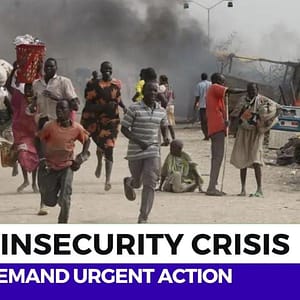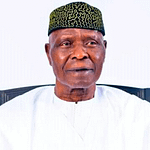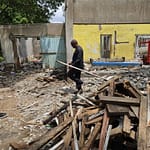Imagine a building, strong and built on firm ground, its walls meant to shelter and protect. Now, imagine its inhabitants noticing cracks appearing, not from an external siege, but from within. This is the unsettling picture painted in parts of Igbo land, where ancient spiritual currents are reportedly merging with modern life, marked by a resurgence of what many Christians term ‘idol worship’. But the most profound shockwave isn’t the return of the old ways; it’s the source of
Table of Contents
- The Bishop’s Thunderclap When Ancient Idols Lure Amidst Modern Faith
- Silent Sanctuaries and Compromised Crosses Unmasking the Flaws the Bishop Decries in Church Leadership
- Beyond Tithes and Testimonies The Deeper Spiritual Vacuum and How it Invites the Old Ways Back
- Answering the Ancestors’ Echoes with Authentic Gospel A Blueprint for Leaders to Rebuild and Reignite Faith
- In Conclusion

The Bishop’s Thunderclap When Ancient Idols Lure Amidst Modern Faith
The spiritual landscape of Igbo land, steeped in rich history and evolving faith, recently echoed with a pronouncement that wasn’t a gentle sermon, but rather a seismic jolt. When the spiritual shepherd raises his voice, particularly with an indictment as sharp as a lightning strike, the ground beneath often shifts. This wasn’t a general lament about societal decay; this was a specific, directed thunderclap aimed not just at members of the flock, but pointedly towards those entrusted with guiding them. The shock wasn’t merely in the message – the concerning rise of engagement with ancient spiritual practices often termed ‘idol worship’ – but in the alleged culpability highlighted. It’s a stark picture: while modern steeples pierce the skyline, whispers of the old ways seem to be finding fertile ground, and the finger of blame is pointing inwards, towards the very sanctuary gates.
Why, then, the indictment of the leaders? The bishop’s piercing words suggest a perceived failure within the church itself, a spiritual void or perhaps a distraction that allows the ancient lures to regain their hold. Is it a lack of depth in teaching, an over-focus on superficial matters, or perhaps a disconnect from the genuine spiritual needs that these old traditions, however misunderstood, might appear to address? The questions hang heavy in the air, wrapped in the spiritual authority of the bishop’s declaration. This isn’t just about church members seeking alternative paths; it’s presented as a crisis fostered, perhaps even inadvertently, from within the leadership structures. The narrative isn’t just about people stumbling; it’s about shepherds potentially nodding off while wolves, or at least persistent ancestral spirits, creep back into the fold. Consider the alleged contrasts contributing to this phenomenon:
| The Ancient Lure (Perceived) | The Modern Faith Challenge (Alleged) |
|---|---|
| Tangible rituals & immediate results | Abstract faith & delayed gratification |
| Strong ancestral/communal ties | Individualism & potential disconnect |
| Addressing specific, earthly problems | Focus on salvation & afterlife |
The bishop’s thunderclap serves as a stark reminder that the battle for spiritual allegiance is far from over, and sometimes, the most critical examination must begin at the pulpit.

Silent Sanctuaries and Compromised Crosses Unmasking the Flaws the Bishop Decries in Church Leadership
Within walls meant to resonate with divine authority and guidance, a disquieting stillness often prevails. These consecrated spaces, intended as refuges of spiritual fortitude, have become eerily quiet on matters demanding prophetic denunciation. The echoes of challenging truths about spiritual decay are strangely absent, replaced perhaps by the comfortable hum of routine or the polite murmur of concession. When the pulpits lose their potent voice, when the shepherds hesitate to confront creeping darkness at the community’s edges and even within the sheepfold, the sanctuary paradoxically offers silence where a thunderclap is needed. This leadership inertia signals a deeper ailment, a surrender of spiritual ground marked by:
- Reluctance to confront syncretism head-on.
- Prioritizing institutional harmony over divine conviction.
- A focus on outward form eclipsing inward spiritual health.
- Failure to equip followers against cultural drift towards ancestral practices.
The very emblem of unwavering faith, the cross, appears less as a fearsome standard against idolatry and more as a decorative artifact under the watch of complacent leadership. These are crosses that have been subtly, perhaps unintentionally, compromised – their power diluted by oversight and a failure to grasp the resurgence of ancient tides. A focus has shifted, trading the rigours of spiritual warfare for administrative ease or worldly appeasement. The bishop’s lament points to a critical disconnect between the expected vigilance of pastoral oversight and the observed reality, creating fertile ground for beliefs and practices long thought dormant to flourish once more:
| Leadership Area | Expected Action | Observed Reality |
|---|---|---|
| Spiritual Vigilance | Active Confrontation | Passive Observation |
| Teaching Focus | Biblical Purity | Cultural Accommodation |
| Engagement with Converts | Deep Discipleship | Surface-Level Adherence |
This indictment suggests the cross, meant to symbolize Christ’s victory and the believer’s separation unto God, stands compromised when those commissioned to uphold it fail to lead the charge against competing altars, leaving the faith vulnerable.

Beyond Tithes and Testimonies The Deeper Spiritual Vacuum and How it Invites the Old Ways Back
The spiritual landscape within many contemporary church walls, unfortunately, risks becoming a well-tro

Answering the Ancestors’ Echoes with Authentic Gospel A Blueprint for Leaders to Rebuild and Reignite Faith
The deep currents of ancestral identity and traditional reverence run strong in the soil of Igbo land. When whispers from the past begin to echo louder than the pronouncements from the pulpit, it’s a seismic indicator that the ground beneath faith is shifting. This isn’t merely a turning away from God; it’s often a turning *towards* fundamental questions the soul is asking, questions the traditional systems once sought to answer: about belonging, protection, identity, and connection to the spiritual realm. Church leaders are called not just to condemn, but to understand the void that allows ancient echoes to fill the space meant for the Gospel’s resounding truth. Rebuilding faith requires acknowledging the legitimacy of these deeply ingrained cultural anchors and presenting the living water of the Gospel as the ultimate fulfillment and transformation of those long-held human yearnings.
A blueprint for reigniting faith in this context delves beyond superficial programs. It necessitates a courageous, introspective look at *how* the Gospel is being embodied and communicated. Does it offer a tangible sense of belonging that transcends kinship ties? Does it speak authoritatively to the need for spiritual safety and security? Does it empower believers to navigate the complexities of their cultural inheritance through the lens of Christ? Leaders must commit to discipleship grounded in cultural intelligence, equipping believers not just to resist external pressures, but to internalize a vibrant faith that is *their own*. This requires a renewed focus on:
- Authentic Relationship: Cultivating communities where love and mutual support are palpable.
- Contextual Relevance: Articulating Gospel truths in ways that address the lived realities and cultural concerns of the people.
- Spirit-led Empowerment: Demonstrating the tangible, transformative power of the Holy Spirit beyond ritual.
- Holistic Formation: Nurturing faith that impacts every sphere of life, including cultural identity and traditional obligations.
Consider the contrast leaders must illuminate:
| Ancestral Echoes May Promise | Authentic Gospel Delivers |
|---|---|
| Ritual Cleansing & Protection | Redemption & Permanent Security in Christ |
| Inherited Identity & Status | New Creation Identity & Heavenly Inheritance |
| Influence via Tradition | Empowerment via the Holy Spirit |
The challenge is significant, but the opportunity to present a Gospel that is deeply rooted and powerfully relevant is even greater. It calls for leaders who are not afraid to confront the ‘echoes’ with the compelling, transformative voice of truth.
In Conclusion
As the sun sets over the rolling hills of Igbo land, casting long shadows on a landscape rich with history and faith, a profound question lingers in the air: Have the very shepherds of the flock strayed into the wilderness of ancient idols once more? Bishop’s bold indictment jolts the community into a moment of reflection, urging church leaders and believers alike to confront the uneasy resurgence of practices long thought abandoned. In this crossroads between tradition and transformation, the path forward demands vigilance, humility, and an unwavering commitment to the core values that bind the faithful. Only then can the light of genuine devotion outshine the shadows of forgotten gods, ushering in a new dawn for Igbo spirituality.














